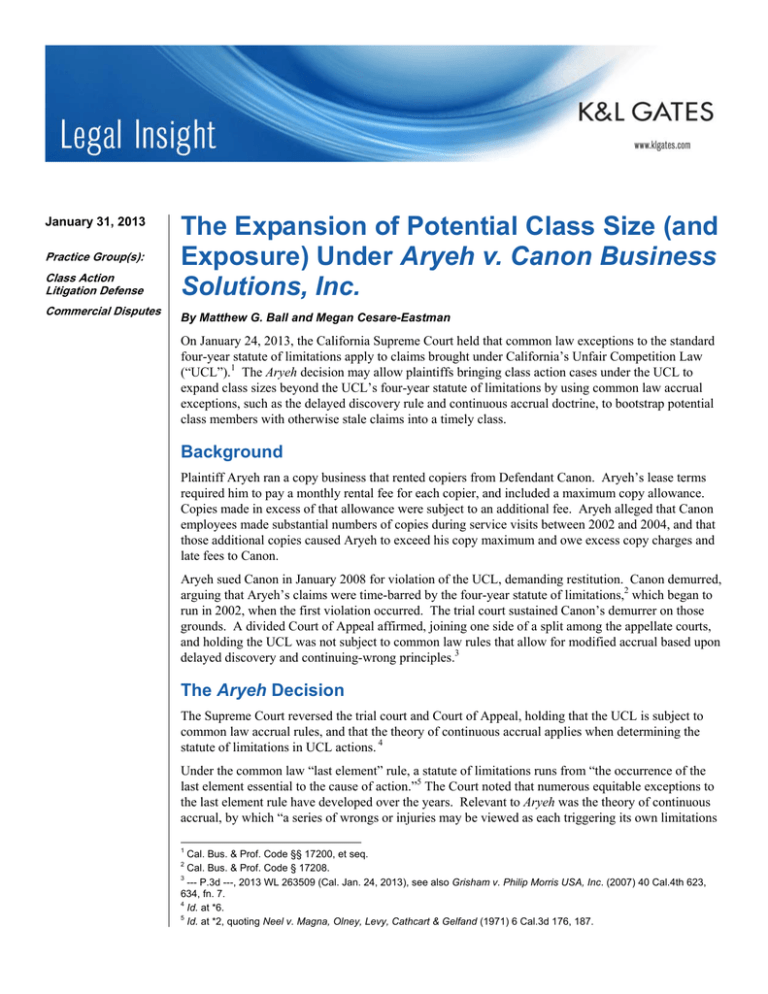
January 31, 2013
Practice Group(s):
Class Action
Litigation Defense
Commercial Disputes
The Expansion of Potential Class Size (and
Exposure) Under Aryeh v. Canon Business
Solutions, Inc.
By Matthew G. Ball and Megan Cesare-Eastman
On January 24, 2013, the California Supreme Court held that common law exceptions to the standard
four-year statute of limitations apply to claims brought under California’s Unfair Competition Law
(“UCL”).1 The Aryeh decision may allow plaintiffs bringing class action cases under the UCL to
expand class sizes beyond the UCL’s four-year statute of limitations by using common law accrual
exceptions, such as the delayed discovery rule and continuous accrual doctrine, to bootstrap potential
class members with otherwise stale claims into a timely class.
Background
Plaintiff Aryeh ran a copy business that rented copiers from Defendant Canon. Aryeh’s lease terms
required him to pay a monthly rental fee for each copier, and included a maximum copy allowance.
Copies made in excess of that allowance were subject to an additional fee. Aryeh alleged that Canon
employees made substantial numbers of copies during service visits between 2002 and 2004, and that
those additional copies caused Aryeh to exceed his copy maximum and owe excess copy charges and
late fees to Canon.
Aryeh sued Canon in January 2008 for violation of the UCL, demanding restitution. Canon demurred,
arguing that Aryeh’s claims were time-barred by the four-year statute of limitations,2 which began to
run in 2002, when the first violation occurred. The trial court sustained Canon’s demurrer on those
grounds. A divided Court of Appeal affirmed, joining one side of a split among the appellate courts,
and holding the UCL was not subject to common law rules that allow for modified accrual based upon
delayed discovery and continuing-wrong principles.3
The Aryeh Decision
The Supreme Court reversed the trial court and Court of Appeal, holding that the UCL is subject to
common law accrual rules, and that the theory of continuous accrual applies when determining the
statute of limitations in UCL actions. 4
Under the common law “last element” rule, a statute of limitations runs from “the occurrence of the
last element essential to the cause of action.”5 The Court noted that numerous equitable exceptions to
the last element rule have developed over the years. Relevant to Aryeh was the theory of continuous
accrual, by which “a series of wrongs or injuries may be viewed as each triggering its own limitations
1
Cal. Bus. & Prof. Code §§ 17200, et seq.
Cal. Bus. & Prof. Code § 17208.
3
--- P.3d ---, 2013 WL 263509 (Cal. Jan. 24, 2013), see also Grisham v. Philip Morris USA, Inc. (2007) 40 Cal.4th 623,
634, fn. 7.
4
Id. at *6.
5
Id. at *2, quoting Neel v. Magna, Olney, Levy, Cathcart & Gelfand (1971) 6 Cal.3d 176, 187.
2
The Expansion of Potential Class Size (and Exposure)
Under Aryeh v. Canon Business Solutions, Inc.
period, such that a suit for relief may be partially time-barred as to older events but timely as to those
within the applicable limitations period.”6 The Court noted that there was nothing about the language
or legislative history of the UCL's statute of limitations that suggested the usual common-law rules of
accrual should not apply to UCL claims.7
What Aryeh May Mean for Class Action Defendants
In UCL class actions, plaintiffs have typically pled classes that extend back four years from the filing
date of the complaint. In its decision in Aryeh, the Supreme Court extended all common law
exceptions to a statute of limitations defense to UCL cases. Class action plaintiffs may rely on Aryeh
to expand the class size when bringing a UCL class action claim. In particular, plaintiffs may attempt
to rely on the delayed discovery rule, which applies in certain situations to postpone the accrual of a
cause of action until the plaintiff discovers, or should have discovered, the cause of action.8 A
plaintiff may attempt to bootstrap stale claims into a UCL class, which otherwise might be limited to
plaintiffs with claims accruing within four years of the filing date. This could potentially enlarge a
defendant’s potential exposure, and thus, the value of the case.
The delayed discovery rule, however, could be a double-edged sword for class action plaintiffs, who
must still show by their motions for class certifications that members of a potential class are
sufficiently similar. A class or subclass based upon claims beyond the four-year statute of limitations
that relies on the delayed discovery rule may result in certain claims that are too individualized to
satisfy commonality requirements under federal and state law.
Authors:
Matthew G. Ball
matthew.ball@klgates.com
+1.415.249.1014
Megan Cesare-Eastman
megan.cesare-eastman@klgates.com
+1.415.882.8086
6
Id. at *3, citing Howard Jarvis Taxpayers Assn. v. City of La Habra (2001) 25 Cal.4th 809, 818-822.
Id. at *4.
8
Norgart v. Upjohn Co. (1999) 21 Cal.4th 383, 397.
7
2
The Expansion of Potential Class Size (and Exposure)
Under Aryeh v. Canon Business Solutions, Inc.
Anchorage Austin Beijing Berlin Boston Brisbane Brussels Charleston Charlotte Chicago Dallas Doha Dubai Fort Worth Frankfurt
Harrisburg Hong Kong London Los Angeles Melbourne Miami Milan Moscow Newark New York Orange County Palo Alto Paris Perth
Pittsburgh Portland Raleigh Research Triangle Park San Diego San Francisco São Paulo Seattle Seoul Shanghai Singapore Spokane
Sydney Taipei Tokyo Warsaw Washington, D.C.
K&L Gates practices out of 46 fully integrated offices located in the United States, Asia, Australia, Europe, the
Middle East and South America and represents leading global corporations, growth and middle-market companies,
capital markets participants and entrepreneurs in every major industry group as well as public sector entities,
educational institutions, philanthropic organizations and individuals. For more information about K&L Gates or its
locations, practices and registrations, visit www.klgates.com.
This publication is for informational purposes and does not contain or convey legal advice. The information herein should not be used or relied upon in
regard to any particular facts or circumstances without first consulting a lawyer.
©2013 K&L Gates LLP. All Rights Reserved.
3
